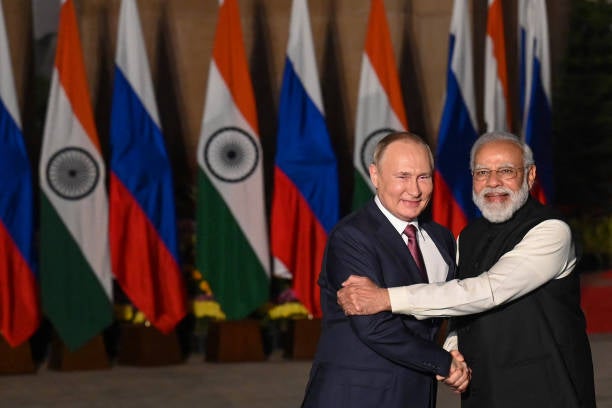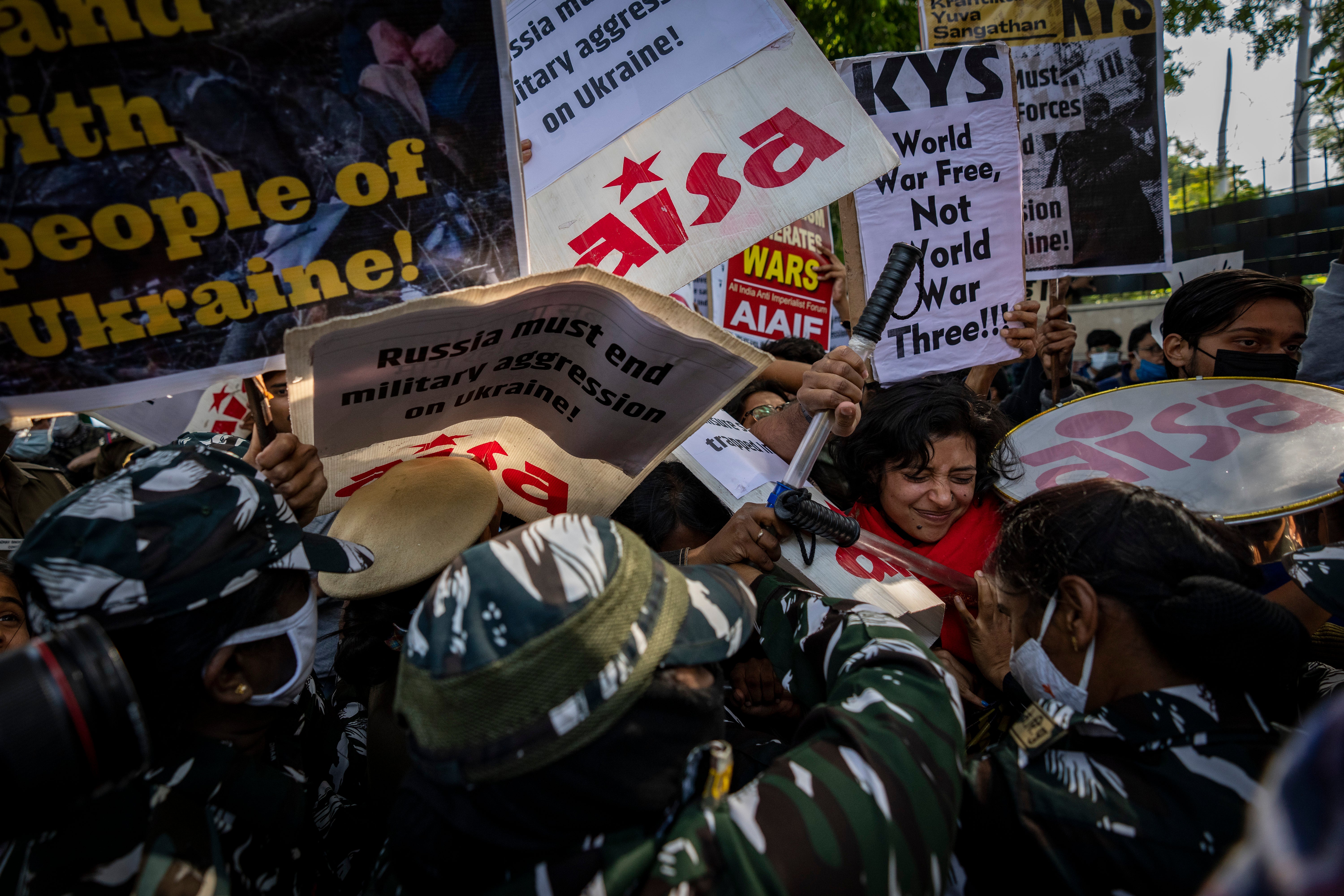India’s ‘oil opportunism’ helps Russia get round energy sanctions
As traditional destinations for Russian oil are thrown into doubt because of sanctions, the world’s third-largest buyer has stepped up and may become its new home, energy experts tell Shweta Sharma


More than three months into its invasion of Ukraine, Russia’s war machine is burning at full throttle as gas and oil continue to flow to many countries despite debilitating sanctions elsewhere.
The inflated prices of Russian energy products have provided financial fuel to the Kremlin’s war chest, as nations paying energy bills have inadvertently injected billions of pounds which might have been used to send more weaponry and troops to Ukraine.
As western democracies devise ways to squeeze the Russian economy and deepen Moscow’s European isolation, Vladimir Putin has turned his sight to relatively untapped and more lucrative markets in Asia – China and India.
At an oil and gas sector industry-specific meeting in April, Putin said “we must diversify exports”, anticipating that energy supplies to the west will continue going down in the foreseeable future. The Russian president also urged industry players to determine key infrastructure facilities and start constructing them to “redirect our exports gradually to the rapidly growing markets of the south and the east”.
India and China, the two largest growing economies in south Asia, have neither joined the west in imposing sanctions nor directly held Russia accountable for human rights violations in Ukraine even as the conflict hits 100 days. But both have raised concerns over the fast deteriorating situation in the eastern European country.
Delhi has charted its own course of foreign policy, clinging tight to its neutral stance in Russia’s war, brushing off criticism and even threats from the west for increasing trade with Moscow.
The European Union’s determination to embargo Russian energy flows into the continent has shone a light on India’s dramatically accelerating oil imports from Moscow, despite logistical challenges, since the invasion of Ukraine began in February.
Arguing that Europe is importing more than what India ever would, New Delhi has veered off in the direction of financial opportunism as it found Russia’s fire sale on oil too good a deal to pass, some analysts say.
India has pulled more than 33 million barrels of Russian crude oil between March and May 2022, more than double the total oil imports of 14 million barrels in 2021, according to Kpler, a data and analytics company. In the first two months of 2022, India had not imported any Russian oil.
By early June, these imports are expected to reach 39 million barrels, Kpler added.
“In the midst of the current situation in Ukraine, India has taken advantage of discounted prices of Russian oil to ramp up imports. This does not violate sanctions, but certainly flags an opportunistic approach,” Simone Tagliapietra, a senior fellow at Brussels-based think tank Bruegel, tells The Independent.
Though the EU relies on its traditional partner Russia for some 25 per cent of its oil, these imports are now quickly decreasing as European companies are no longer buying as they used to, Tagliapietra notes.
“Self-sanctioning is in full swing, and this is the reason why it is increasingly difficult for Russia to sell its oil in Europe. India imports way less oil from Russia than Europe, but the trend is ascending during the war, while in Europe it is decreasing,” he says.
On Monday, European Union leaders moved to impose a partial oil embargo on Russia. The watered-down embargo covers only Russian oil brought in by sea, allowing a temporary exemption for imports delivered by pipeline.
This deal is, however, expected to cover more than two-thirds of oil imports from Russia. Ursula von der Leyen, the president of the European Commission, said the move would “effectively cut around 90 per cent of oil imports from Russia to the EU by the end of the year”.
India is the third-largest importer of oil in the world after China and the US, and ships in more than 80 per cent of its crude needs.
Russia makes up a small fraction of Indian oil imports – only around two per cent in 2021. In the last 15 years, New Delhi fulfilled about 60 per cent of its needs from the Persian Gulf countries, while Africa and South America made up the rest.
Until 2021, Russia was the 10th-largest oil supplier to India. But it has now jumped to the fourth position as oil purchases rose to a record 6 per cent, about 277,000 barrels per day in April, Reuters’ tanker tracking data shows.
India received more than 24 million barrels of Russian crude oil in May, compared to 7 million barrels in April and about 3 million in March, according to Refinitiv Eikon oil flows.
Overall goods imports from Russia have also multiplied many times, reaching $6.4bn (£5.08bn) between 24 February and 26 May, compared with $1.9bn in the same period last year.
These imports include crude oil and petroleum products, coal, coke and briquettes, and fertiliser. India’s purchases of crude oil jumped by 393 per cent, petroleum by 175 per cent, and both coal products and fertilisers saw a triple-digit increase, the Financial Express reported, citing industry sources.
“If oil is available, and at a discount, why shouldn’t I buy it?” Indian finance minister Nirmala Sitharaman asked last month.
Energy experts suggest that the trends as well as India’s temperament suggest they are a reflection of Russia having to find a new home for its crude as Europe turns away.
Matt Smith, a lead oil analyst at Kpler, tells The Independent that India is picking up the slack left by the European market. He adds that India’s imports from Russia are expected to rise even though they are only incremental and not substantial in the grand scheme of things.
“Seaborne Russian crude exports climbed to 3.77 million barrels per day [in April] – a multi-year high. This rise appears to be the result of domestic Russian refinery maintenance, which freed up more barrels to be exported, while India has picked up the slack left by a modest dip in exports into Europe in the last two months,” he says.
Smith says that the EU’s embargo on Russian energy commodities may either increase pressure on India to cut imports or encourage India to import more.
“The country is already buying Russian Urals crude at a very steep discount,” he says, adding that with the EU banning some Russian oil imports, “that discount will likely become even wider and hence even more attractive for India”.
Smith adds that India could be playing a “very small but symbolic role” in prolonging the Russian war, given the import volumes involved.
However, industry experts in India argue that its trade with Russia is too minuscule to even make a dent in Moscow’s economy. Besides, they say, for an economy as weak as India’s, decisions should be based on economics and not principles.
“I feel western pressure on India to wean off Russian imports is very exaggerated and unwarranted as India hardly buys any oil,” Narendra Taneja, an energy expert tells The Independent.
“And tomorrow, if there is a possibility to buy Russian oil, they [India] must look at it. We are extremely vulnerable when it comes to energy security. We are the only large developing country which is heavily dependent on imports from other countries.”
India has invested $16bn in oil and gas assets for trade with Russia to date, he says, hitting out at both the west and Moscow for “weaponising oil”.

India is also considering reviving the rupee-rouble payment mechanism – an alternative system to settle dues in rupees that was previously used in 1953 during the Soviet era – after the EU prohibited local transactions with Russian entities using euro-denomination banknotes and the US cut Russia’s access to the dollar after the Ukraine invasion.
The Federation of Indian Export Organisation, the apex trade promotion body of the Indian government, has floated the offer to shift to rupee-rouble trade as there are plenty of opportunities, says Ajay Sahai, its director general and CEO.
“The rupee-rouble mechanism has been proposed to increase trade between India and Russia because the trade is happening in free foreign currency, but at this point in time Russia is short of free foreign currency and a lot of buyers have shown interest in dealing in the rouble,” he says.
He adds that the war has impacted trade routes through the Black Sea and very few shipments are going as only some shipping lines are taking cargo.
But India’s appetite for Russian imports doesn’t end with oil. It might also delve into exporting products that have not been sanctioned, in an effort to fill up any vacuum, the trade body head says.
“There is room for better trade with Russia in the food and pharma sector as many Russian companies have shown interest and demand has gone up due to sanctions. But to what extent it would materialise is to be seen.”
He adds: “Let us not see what is to gain from the war; the priority should be a ceasefire as early as possible as the worst is yet to come.”
However, despite India’s reluctance to condemn Russia, Delhi continues to secure diplomatic wins as Prime Minister Narendra Modi’s bonhomie was on full display last month with European and western leaders – many of whom condemned war crimes in Ukraine at full decibel.

Modi received a warm welcome in Germany last month as Chancellor Olaf Scholz called him a “super partner” and recently re-elected French leader Emmanuel Macron received him with a hug. Boris Johnson, who visited India just before Modi’s Europe tour, lavished praise for the “khaas dost”, or special friend.
After early calls to break away from Moscow, western leaders made a point of avoiding tense exchanges over Delhi’s ties with its historic partner. Instead, the UK and France announced defence partnerships, while Ms Von der Leyen and Australia accelerated work for trade deals.
India is emerging as a strong and confident country, says Nandan Unnikrishnan, vice president and senior fellow at the Observer Research Foundation.
“India’s position was well understood globally. Leaders beating a path to New Delhi, despite knowing India's position on Ukraine is unlikely to change right now, shows India has a role to play as a churn is happening in the world and the global order may change,” he says.
Some analysts, however, add a note of caution: India may eventually find itself in a difficult spot as evidence of war crimes continue to mount in Ukraine along with the death toll.
“India’s stance on Ukraine becomes more difficult to maintain as Russia’s war crimes escalate,” Jonah Blank of the National University of Singapore and Rand Corporation tells The Independent.
“China’s position is ruthless but coherent: Beijing simply does not care about human rights, and cannot be shamed by actions that it does not regard as shameful. India, as a democracy, doesn’t have the luxury of shamelessness.”






Join our commenting forum
Join thought-provoking conversations, follow other Independent readers and see their replies
Comments